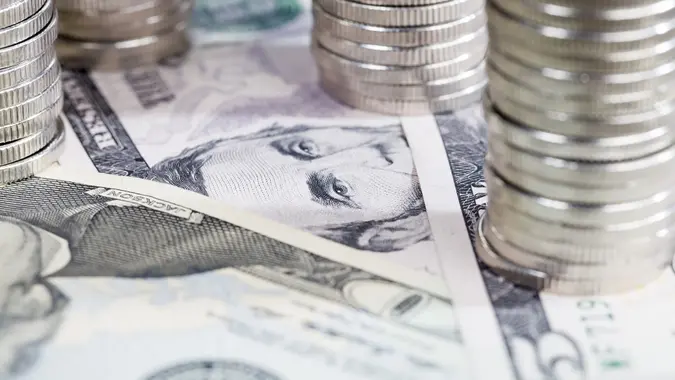Best CD Rates Today: October 8, 2025 — Earn Up to 5.11% APY

Commitment to Our Readers
GOBankingRates' editorial team is committed to bringing you unbiased reviews and information. We use data-driven methodologies to evaluate financial products and services - our reviews and ratings are not influenced by advertisers. You can read more about our editorial guidelines and our products and services review methodology.

20 Years
Helping You Live Richer

Reviewed
by Experts

Trusted by
Millions of Readers
Looking for the best certificate of deposit (CD) rates today? As of Oct. 8, 2025, Daniels-Sheridan Federal Credit Union is offering the best rate at 5.11% annual percentage yield (APY) for a 12-month CD. A minimum deposit of $500 is required.
CDs remain a low-risk way to grow your savings. Below, you’ll find the best CD rates by type, term length and category, plus tips for choosing the right one for your savings goals.
Key Takeaways
- Highest CD rate today: Daniels-Sheridan Federal Credit Union’s 1-year CD at 5.11% APY
- Best CD type for flexibility: Ponce Bank’s 4-month no-penalty CD at 4.10% APY
- Best choice for large deposits: Hughes Federal Credit Union’s 17-month jumbo CD at 4.29% APY on balances of $99,000 or more
- CD rates outlook: With the Fed signaling more rate cuts, CD yields may begin to slip — making now a good time to lock in higher APYs.
Best CD Rates for Oct. 8, 2025
From short-term to jumbo, here are some of the best CD rates available right now.
| Best For | Institution | Term | APY | Minimum Deposit |
|---|---|---|---|---|
| Overall rate | Daniels-Sheridan Federal Credit Union | 1 year | 5.11% | $500 |
| Short-term CD | Ivy Bank | 3 months | 4.35% | $1,000 |
| Long-term CD | KS State Bank | 7 years | 4.10% | $500 |
| No-penalty CD | Ponce Bank | 4 months | 4.10% | $1 |
| Jumbo CD | Hughes Federal Credit Union | 17 months | 4.29% | $99,000 |
Best CD Rates by Type
From short-term CDs to jumbo deposits, these are the top CD rates by account type right now.
Best Short-Term CD Rates
Short-term CDs — three to six months — offer quick returns and keep your savings flexible while still earning competitive yields.
| Term | Institution | APY | Minimum Deposit |
|---|---|---|---|
| 3 months | Ivy Bank | 4.35% | $1,000 |
| 3 months | Dow Credit Union | 4.15% | $500 |
| 6 months | Colorado Federal Savings Bank | 4.35% | $5,000 |
| 6 months | United Fidelity Bank | 4.35% | $1,000 |
Best Jumbo CD Rates
Got a large deposit? Jumbo CDs often pay higher APYs on $50,000 or more. These are the best jumbo CD rates today for high-balance savers.
| Term | Institution | APY | Minimum Deposit |
|---|---|---|---|
| 17 months | Hughes Federal Credit Union | 4.29% | $99,000 |
| 5 years | Advancial | 4.23% | $50,000 |
| 6 months | My eBanc | 4.20% | $50,000 |
| 4 months | Princeton Federal Credit Union | 4.14% | $100,000 |
Best No-Penalty CD Rates
No-penalty CDs give you the freedom to withdraw funds early without fees. Here are the best no-penalty CD rates today.
| Term | Institution | APY | Minimum Deposit |
|---|---|---|---|
| 4 months | Ponce Bank | 4.10% | $1 |
| 11 months | Marcus by Goldman Sachs | 3.95% | $500 |
| 13 months | Marcus by Goldman Sachs | 3.95% | $500 |
| 11 months | USALLIANCE Financial | 3.90% | $500 |
Best 1-Year CD Rates
One-year CDs balance solid APYs with a shorter commitment. The best 12-month CD rates today are well above the national average of 1.70%.
| Term | Institution | APY | Minimum Deposit |
|---|---|---|---|
| 1 year | Daniels-Sheridan Federal Credit Union | 5.11% | $500 |
| 1 year | Ponce Bank Direct | 4.25% | $1,000 |
| 1 year | Home Savings Bank | 4.20% | $10,000 |
| 1 year | Limelight Bank | 4.20% | $1,000 |
Best Long-Term CD Rates
Long-term CDs, generally three years or more, reward savers with higher APYs for keeping funds locked in over a longer period.
| Term | Institution | APY | Minimum Deposit |
|---|---|---|---|
| 3 years | Credit Union of Atlanta | 4.35% | $500 |
| 4 years | Credit Union of Atlanta | 4.35% | $500 |
| 5 years | Copper Basin Federal Credit Union | 4.33% | $1,000 |
| 6 years | First National Bank of America | 3.90% | $1,000 |
| 7 years | KS State Bank | 4.10% | $500 |
How Much Can You Earn With a CD Right Now?
A $10,000 deposit in a one-year CD earning 5.11% APY will generate $511 in interest by the end of the term. These earnings are substantially more than what a standard checking or traditional savings account offers.
Here’s a chart comparing different deposit amounts and what you could earn after one year and then five years.
| Deposit Amount | 1-Year at 5.11% APY | 5-Year at 5.11% APY |
|---|---|---|
| $1,000 | $51.10 | $282.98 |
| $5,000 | $255.50 | $1,414.90 |
| $10,000 | $511 | $2,829.81 |
| $20,000 | $1,022 | $5,659.62 |
| $25,000 | $1,277.50 | $7,074.52 |
CD Rate Outlook: Where Rates Could Go Next
The Federal Reserve lowered interest rates for the first time this year and signaled that more cuts may be coming. As the Fed explained in its September statement, “the Committee decided to lower the target range for the federal funds rate by 0.25% to 4% – 4.25% in light of the shift in the balance of risks.”
That means CD rates could start slipping from the recent highs. Short-term CD rates could see the biggest changes, while long-term rates might stay steadier — but still lower than before.
As Experian puts it, “interest rates on CDs have been gradually declining since September 2024, and they’re expected to continue dropping as 2025 comes to a close.”
If you’re considering opening a CD, now could be a good time to lock in. With rates hovering between 4% and 5%, it may be near the peak of this rate cycle.
Final Take: Should You Open a CD Account Today?
If you’re considering investing in a CD, reflect on what works best for your financial strategy.
- Looking for guaranteed returns? A short-term CD can secure a higher APY and give you the option to invest in another CD if rates rise again.
- Don’t need liquidity? If you don’t need cash, a long-term CD is a good way to grow your funds.
- Want flexibility? A no-penalty CD lets you earn interest while still allowing early access to funds.
Pro Tip
Consider CD laddering — a strategy where you split your savings across multiple CDs with staggered maturity dates. This allows you to earn higher rates on longer-term CDs while still giving you periodic access to cash when each CD matures.
Glossary of CD Terms
Understanding these common CD terms can help you make smarter choices when comparing accounts and rates.
- Add-on CD: With an add-on CD, you can make subsequent deposits after your initial funding. A standard CD, on the other hand, limits you to one deposit at the beginning of the term.
- Brokered CD: This CD type is issued by a bank, but sold through a brokerage firm like Fidelity. These CDs can offer higher rates or a wider selection of terms than what’s typically available at a local bank.
- Bump-up CD: During the term of a bump-up CD, account holders can increase their APY without changing the term. Typically, only one bump-up is allowed. These CDs are also known as “raise-your-rate” CDs.
- Early withdrawal penalty: When you invest in a CD, you’re locked in for a specific term. Unless you have a no-penalty CD, you will incur an early withdrawal penalty if you withdraw funds before the maturity date.
- No-penalty CD: This is a special type of CD that will not penalize you for withdrawing funds prior to the maturity date.
- Share certificate: A share certificate is issued by a credit union. Typical CD accounts are usually issued by banks.
CD Rates FAQ
Got questions about CD accounts? Here’s what savers are asking most right now.- What is the highest paying CD rate right now?
- Daniels-Sheridan Federal Credit Union is currently offering the best rate at 5.11% for a 12-month CD.
- What should you consider when choosing a CD?
- When selecting a CD, consider factors like:
- Term length
- Interest rate
- Minimum deposit requirements
- Early withdrawal penalties
- CDs are generally safer investments, but many have an early withdrawal penalty if you access the funds before it matures. This reduces the overall return you could receive from the CD.
- When selecting a CD, consider factors like:
- Are there any 6% CDs?
- Currently, the top CD rate available today is 5.11% APY. While 6% APYs aren’t available in the current market, limited-time promotions do pop up occasionally so it’s a good idea to check back regularly to catch the most competitive rates.
- Can you lose money on a CD?
- It’s rare, but you can lose money if the bank or credit union isn’t FDIC- or NCUA-insured, or if the CD is tied to the market and the value drops.
Compare CD Rates
- Best 3-Month CD Rates
- Best 6-Month CD Rates
- Best 1-Year CD Rates
- Best 5-Year CD Rates
- Best No-Penalty CD Rates
- Best Jumbo CD Rates
- Best No-Penalty CD Rates
- Best CDs With No Minimum Deposit Requirement
- Best CD Accounts
Methodology: GOBankingRates analyzes deposit rates from banks and credit unions with nationwide availability. The best rates are identified from this group by focusing on APY. Institutions listed in the daily chart are insured by the Federal Deposit Insurance Corporation or the National Credit Union Share Insurance Fund.
Financial institutions may require certain eligibility criteria — such as membership, existing accounts or location-based restrictions — to open an account or qualify for the listed rates. Always verify account terms, conditions and regional availability with the institution before applying.
Rates are subject to change; unless otherwise noted, rates are updated periodically. All other information on accounts is accurate as of Oct. 8, 2025.
Our in-house research team and on-site financial experts work together to create content that’s accurate, impartial, and up to date. We fact-check every single statistic, quote and fact using trusted primary resources to make sure the information we provide is correct. You can learn more about GOBankingRates’ processes and standards in our editorial policy.
- FDIC. 2025. "National Rates and Rate Caps – September 2025."
- Federal Reserve. 2025. "Federal Reserve issues FOMC statement."
- Experian. 2025. "CD Rates Forecast for 2025: Are CD Rates Going Up or Down?"
 Written by
Written by  Edited by
Edited by 

























